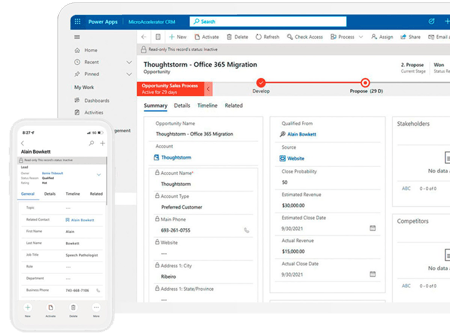Have your sales or account management teams ever heard the following statements from a current or prospective customer?
- “I thought you forgot all about us. Is our account not important to you?”
- “I already heard back from someone else in your office earlier this week.”
- “Enough with the automated emails! I told you three times I don’t want them.”
- “I like your team a lot, but it seems like your company doesn’t have its act together.”
This kind of unfortunate customer interaction is deadly for B2B enterprises whose success requires the development of a healthy client relationships—and they should be avoided at all costs. If it feels like the left hand doesn’t know what the right hand is doing at your company in terms of lead tracking, sales generation, and client relations, then it may be time to reassess your customer relationship management (CRM) system.
What is a CRM?
Business is getting increasingly complicated and competitive, and the relationships your team develops with customers from the first point of contact are critical to growing your bottom line. Put simply, a CRM system is data technology used to maintain and develop customers or potential customers for the purpose of growing your business. 
As a tool for your company, a CRM should possess the features you need to maintain healthy, timely, and appropriate interactions with customers throughout the sales funnel. Depending on your company’s needs, key features could include anything from a history or timeline of interactions and up-to-date contact information to sales pipeline management and AI-powered forecasting. Finding the CRM that meets your company where it is and stays with you as it grows is critical to maintaining and boosting revenue in a competitive landscape.
Microsoft offers several CRM options using PowerApps—their suite of apps, services, and connectors—which provide rich business logic and workflow capabilities. Let’s dive deeper into some of these options so you can find the CRM functionality that would be most appropriate for your team’s optimal growth and success.
Microsoft Dataverse
For small businesses just getting started with customer relationship management, Microsoft’s Dataverse is an out-of-the-box, cloud-based Power App database that is essentially its own mini-CRM system.
With Dataverse, you can keep track of accounts, contacts, and activities like phone calls, emails, and notes in tables that are easily accessible and searchable with Power Query functionality. With a base set of standard tables covering typical scenarios, Dataverse can also be customized to address your company’s specific needs.
Level Up with Aerie’s Micro Accelerator
If your company has already laid the groundwork for customer relationship management (CRM) and is ready to elevate its capabilities, consider investing in the Micro Accelerator. Developed by Aerie, this Power App-based CRM is designed for small-to-midsize businesses seeking a more sophisticated system for tracking sales.
The Micro Accelerator not only includes all the essential features found in Dataverse but also enhances the CRM interface by efficiently managing the sales pipeline and tracking leads and opportunities. With intuitive dashboards, it seamlessly integrates with Power BI, delivering comprehensive sales and management insights for C-suite executives.
Offering a complete CRM experience while remaining lightweight and cost-effective, Aerie’s Micro Accelerator is the perfect solution to take your business to the next level.
Dynamics 365 for Sales
For companies who require an even more in-depth CRM, we suggest Microsoft’s Dynamic 365 for Sales. This comprehensive CRM platform allows for company sales teams to not only manage their relationships, but to strategize what might improve sales throughout the funnel and develop targeted responses to customers.
Related Article: Benefits of the Dynamics 365 Integrations with Office 365
By using artificial intelligence functionality, Dynamic 365 for Sales suggests the best sequence of actions to streamline your sales cycle. Dynamic 365 can predict revenue fluctuations and highlight areas for improvement. As a result, sales teams can get up-to-date insights about customer sentiment, market competition, and sales priorities. While it may be excessive for some small-to-midsize companies, this CRM provides a lot of power under the hood and is the ideal fit for large, more complex companies.
Final Thoughts
Every company has different needs when it comes to a customer relationship management system. At Aerie, we partner with our clients to provide the functionality and power they need to grow their business, without overwhelming them with unnecessary features and outsized costs. Most importantly, since all three of these options are built on the Microsoft Power Platform, your CRM system can adapt as your company grows—and we can increase functionality without painful transitions or changes in service.
Share